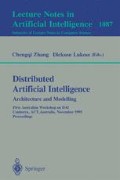Abstract
We present the main modelling steps of the MASB method, an analysis and design method for the development of multi-agent systems viewed as systems composed of software agents playing various roles in predetermined scenarios. We show how agents can play several roles at once and how roles and scenarios can be used to partition agents' knowledge bases. We describe specific roles such as a scenario manager, an object server and a conversation interpreter which are implemented in SMAUL, an environment which is used to generate the main modules of scenario-based multi-agent systems. We present several modelling techniques that can be used in collaboration with users to describe scenarios, agents' roles and their main knowledge structures during the analysis phase. During the design phase these models are transformed by designers into formal specifications as inputs to SMAUL.
Preview
Unable to display preview. Download preview PDF.
Bibliography
ACM (1994), Communications of the ACM, Special issue on Intelligent Agents, v37-17.
Cammarata S., McArthur D., and Steeb R. (1983), “Strategies of Cooperation in Distributed Problem Solving”, Proc. 8th Joint Conf. on AI, Karlsube, Germany, 767–770, 1983.
Carmichael A. (edt) (1994), Object Development Methods, SIGS Books, New York.
Carroll J. M. (1995), Scenario-Based Design, Wiley.
Cohen P. R. and Levesque H. J. (1990), Persistence, intention and commitment, in Cohen P. R., Morgan J., Pollack M. E. (eds). Intentions in Communication, MIT Press, 33–69.
IEEE (1995), IEEE Expert, Special issue on Intelligent Internet Services, vol 10 n 4.
Jacobson I., Christersson M., Jonsson P. and Overgaard G. (1992), Object-Oriented Software Engineering — A Use-Case Driven Approach, Addison Wesley.
Jennings N., and O'Hare G. edts (1995), Foundations of Distributed AI, Wiley.
Kendall E. A., Malkoun M.T., and Jiang C.H. (1996), A methodology for developing agent-based systems, Proceedings of the First Australian Workshop on DAI, D. Luckose and C. Zhang edts., Lecture Notes on Artificial Intelligence, Springer Verlag.
Lesser V. edt.(1995), ICMAS-95, Proceedings of the First International Conference on Multi-Agent Systems, MIT Press.
Lizotte M., and Moulin B. (1990), A temporal planner for modelling autonomous agents, in Demazeau Y., Müller J-P edts, Decentralized Artificial Intelligence, Elsevier, 121–136.
Maes P. (1994), Agents that reduce work and information overload, in (ACM94), 31–40.
Moulin B. (1983), The use of EPAS/IPSO approach for integrating Entity Relationship concepts and Software Engineering techniques, in Davis C.G., Jajodia S., Ng P.A., Yeh R. editors, Entity-Relationship Approach to Software Engineering, North Holland.
Moulin B., Boulet M. M., and Meyer M.A. (1992), Toward user-centered approaches for the design of knowledge-based systems, in Expert Systems for Information Management, vol 5 n2, 95–123.
Moulin B., and Chaib-draa B. (1995), Distributed Artificial Intelligence: an overview, to appear in (Jennings et al. 1995).
Moulin B., and Cloutier L. (1994), Collaborative work based on multiagent architectures: a methodological perspective, in Aminzadeh F., Jamshidi M. edts, Soft Computing: Fuzzy Logic, Neural Networks and Distributed Artificial Intelligence, 261–296, Prentice Hall.
Norman D. A., and Draper S. W. (Edts.) (1986), User-Centered System Design — New Perspectives on Human Computer Interaction, Lawrence Erlbaum.
Pan J. Y. C. and Tenenbaum J. M. (1991), An intelligent agent framework for enterprise integration, in IEEE Trans on Systems, Man and Cybernetics, vol 21, n 6, 1391–1408.
Rao A.S., and Georgeff M.P. (1995), BDI agents: from theory to practice, in (Lesser 1995), 312–319.
Rumbaugh J., Blaha M., Premerlani W., Eddy F., and Lorensen W (1991), Object-Oriented Modeling and Design, Prentice-Hall.
Schank R., and Abelson R. (1977), Scripts, Plans and Goals, Lawrence Erlbaum.
Schuler D., and Namioka A. (Edts.) (1993), Participatory Design: Principles and Practices, Lawrence Erlbaum.
Searle J. R., and Vanderveken D. (1985) Foundations of Illocutionary Logic, Cambridge University Press.
SIGCHI Bulletin (1992), Special issue on scenarios, 24 (4).
Wirfs-Brock R., Wilkerson B., and Wiener L. (1990), Designing Object-Oriented Software, Prentice Hall.
Author information
Authors and Affiliations
Editor information
Rights and permissions
Copyright information
© 1996 Springer-Verlag Berlin Heidelberg
About this paper
Cite this paper
Moulin, B., Brassard, M. (1996). A scenario-based design method and an environment for the development of multiagent systems. In: Zhang, C., Lukose, D. (eds) Distributed Artificial Intelligence Architecture and Modelling. DAI 1995. Lecture Notes in Computer Science, vol 1087. Springer, Berlin, Heidelberg. https://doi.org/10.1007/3-540-61314-5_32
Download citation
DOI: https://doi.org/10.1007/3-540-61314-5_32
Published:
Publisher Name: Springer, Berlin, Heidelberg
Print ISBN: 978-3-540-61314-5
Online ISBN: 978-3-540-68456-5
eBook Packages: Springer Book Archive

